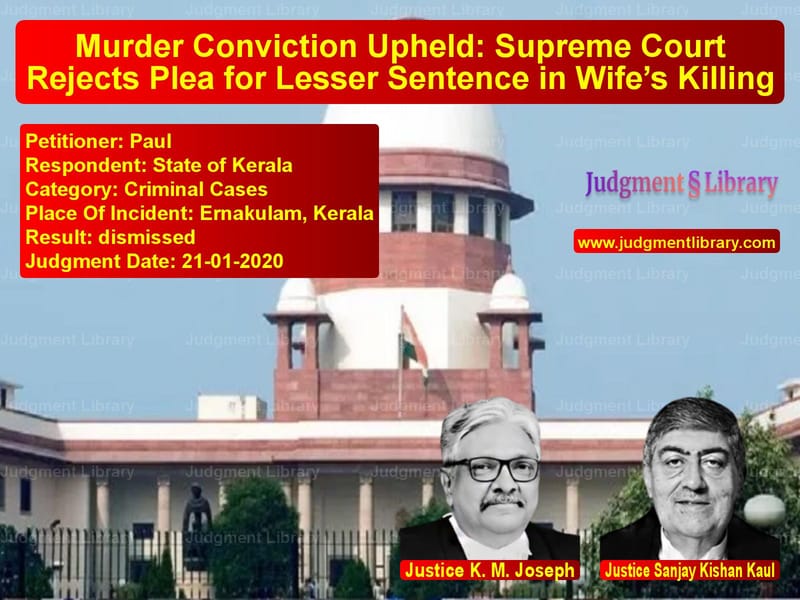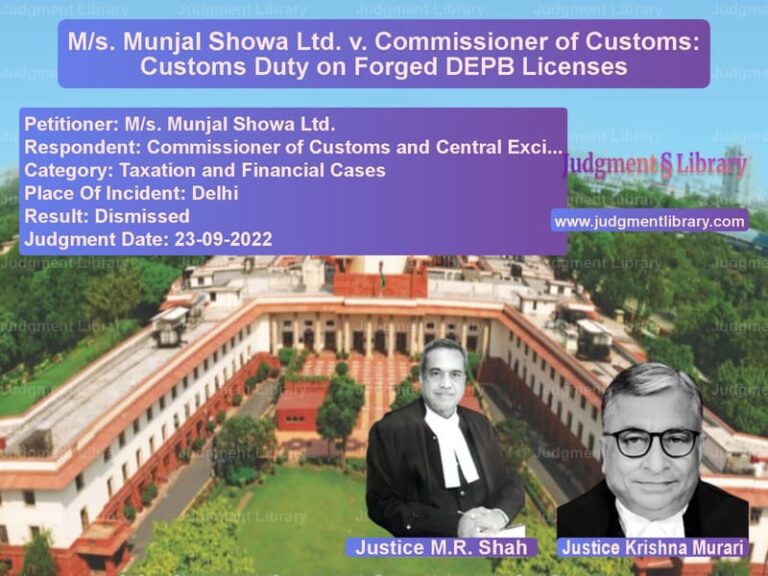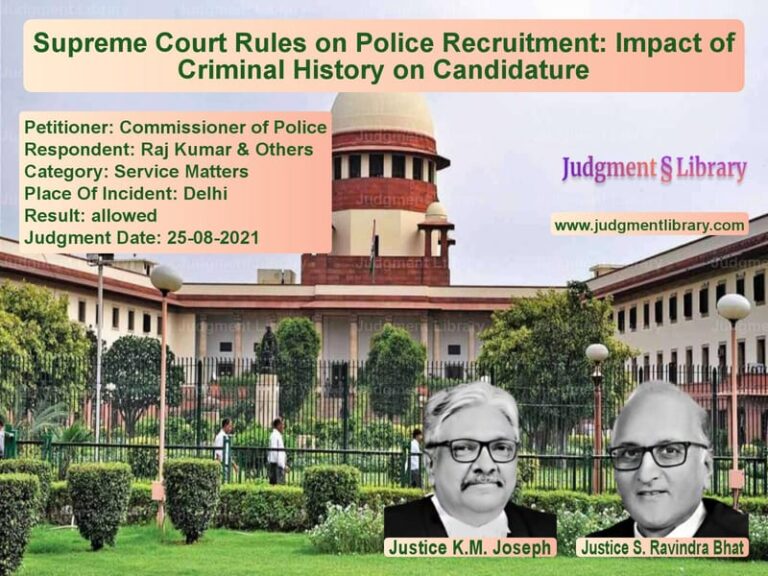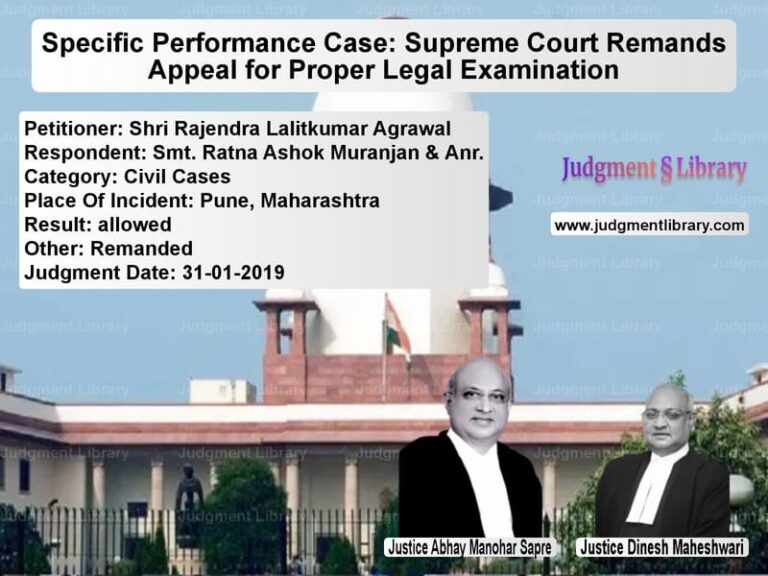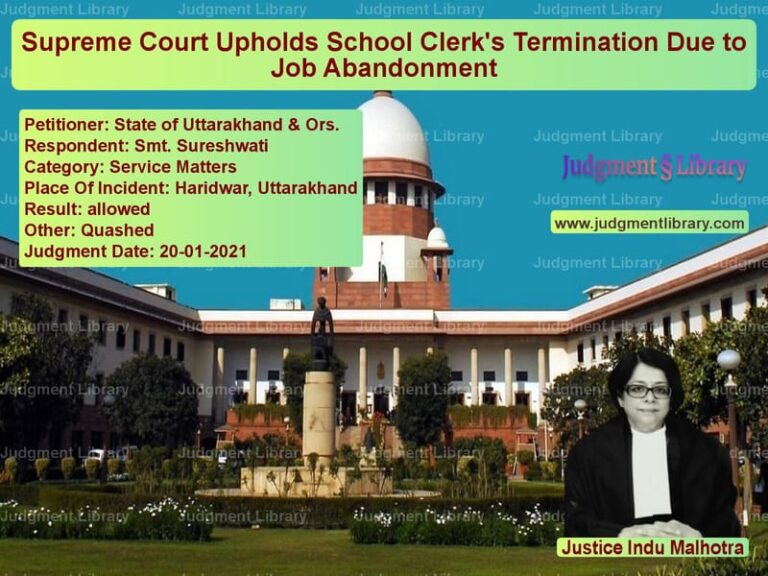Murder Conviction Upheld: Supreme Court Rejects Plea for Lesser Sentence in Wife’s Killing
The case of Paul vs. State of Kerala is a significant ruling in the domain of criminal law, particularly regarding the application of Section 302 (Murder) and Section 304 (Culpable Homicide Not Amounting to Murder) of the Indian Penal Code (IPC). The Supreme Court, in its judgment, upheld the conviction of the appellant, Paul, for the murder of his wife, rejecting his plea for a lesser sentence under Section 304, Part-II IPC.
The judgment provides crucial insights into the legal distinctions between murder and culpable homicide not amounting to murder, the burden of proof in such cases, and the role of Section 313 CrPC in criminal trials.
Background of the Case
- The appellant, Paul, was convicted under Section 302 IPC for the murder of his wife, Jessy, and sentenced to life imprisonment along with a fine of Rs. 10,000.
- The case initially resulted in the acquittal of the accused by the trial court, but the Kerala High Court, upon appeal by the State, reversed the acquittal and ordered a retrial.
- In the retrial, the trial court found Paul guilty of throttling his wife to death and convicted him under Section 302 IPC.
- The Kerala High Court affirmed this conviction, leading to an appeal before the Supreme Court, where the appellant sought a reduction in the charge from murder to culpable homicide not amounting to murder under Section 304, Part-II IPC.
Key Legal Issues Considered
- Was the act committed by the appellant a case of murder (Section 302 IPC) or culpable homicide not amounting to murder (Section 304 IPC)?
- Did the appellant act under grave and sudden provocation, bringing the case under Exception 4 of Section 300 IPC?
- Was the burden of proof met to sustain a conviction for murder?
- What was the role of the accused’s intoxication in the crime?
Arguments of the Petitioner (Paul)
- Paul argued that he was under the influence of alcohol and got into a sudden fight with his wife, leading to an unintentional act of throttling her.
- He contended that his wife was suffering from depression following an abortion and that there was no premeditation in the act.
- The defense relied on Exception 4 to Section 300 IPC, which provides that culpable homicide is not murder if committed in the heat of passion upon a sudden quarrel.
- He pointed out that he had injuries, suggesting a struggle and reinforcing his claim that there was a fight.
- Paul also contended that the trial court had wrongly rejected his plea and had ignored mitigating factors such as his state of mind and the provocation from his wife.
Arguments of the Respondent (State of Kerala)
- The prosecution argued that the appellant had intentionally throttled his wife, as evidenced by medical reports and witness testimonies.
- They pointed out that the appellant had falsely claimed that his wife had committed suicide, which was contradicted by medical evidence.
- The presence of injuries on the victim’s body, particularly bruises on her neck and face, indicated a case of homicidal strangulation.
- The prosecution emphasized that the appellant failed to provide a credible explanation for his wife’s death despite having exclusive knowledge of the incident.
- They further argued that Paul’s intoxication was not a valid defense under Section 86 IPC, which states that intoxicated individuals are presumed to have intended the consequences of their actions unless intoxication was involuntary.
Supreme Court’s Observations
- The Court held that the prosecution had successfully proven that Paul intentionally caused the death of his wife by throttling.
- The medical evidence clearly established that the death was caused by asphyxiation due to strangulation, ruling out the possibility of suicide.
- The injuries on the victim’s body suggested a violent attack, and the defense’s claim of a sudden quarrel was not supported by evidence.
- The Court found that the appellant had falsified his defense by initially claiming suicide, which undermined his plea for a lesser conviction.
- Regarding intoxication, the Court reaffirmed that under Section 86 IPC, an intoxicated person is still held accountable for their actions.
- The judgment stated: “The act of the appellant in throttling his wife cannot be excused under Exception 4 to Section 300 IPC. The brutality of the act and the nature of injuries rule out any element of sudden fight or provocation.”
Final Judgment
The Supreme Court upheld the conviction of Paul under Section 302 IPC, rejecting his plea for reduction to culpable homicide not amounting to murder under Section 304 IPC. The Court ruled:
- The appellant’s actions were intentional and deliberate, and there was no justification for reducing the sentence.
- The defense’s claim of sudden quarrel was unsubstantiated.
- The appellant was liable to serve life imprisonment as per the original sentence.
This judgment sets a strong precedent in distinguishing between murder and culpable homicide, reaffirming that voluntary intoxication does not mitigate criminal responsibility and that a false plea by the accused can weigh against them in judicial proceedings.
Petitioner Name: Paul.Respondent Name: State of Kerala.Judgment By: Justice K. M. Joseph, Justice Sanjay Kishan Kaul.Place Of Incident: Ernakulam, Kerala.Judgment Date: 21-01-2020.
Don’t miss out on the full details! Download the complete judgment in PDF format below and gain valuable insights instantly!
Download Judgment: Paul vs State of Kerala Supreme Court of India Judgment Dated 21-01-2020.pdf
Direct Downlaod Judgment: Direct downlaod this Judgment
See all petitions in Murder Cases
See all petitions in Bail and Anticipatory Bail
See all petitions in Judgment by K.M. Joseph
See all petitions in Judgment by Sanjay Kishan Kaul
See all petitions in dismissed
See all petitions in supreme court of India judgments January 2020
See all petitions in 2020 judgments
See all posts in Criminal Cases Category
See all allowed petitions in Criminal Cases Category
See all Dismissed petitions in Criminal Cases Category
See all partially allowed petitions in Criminal Cases Category

